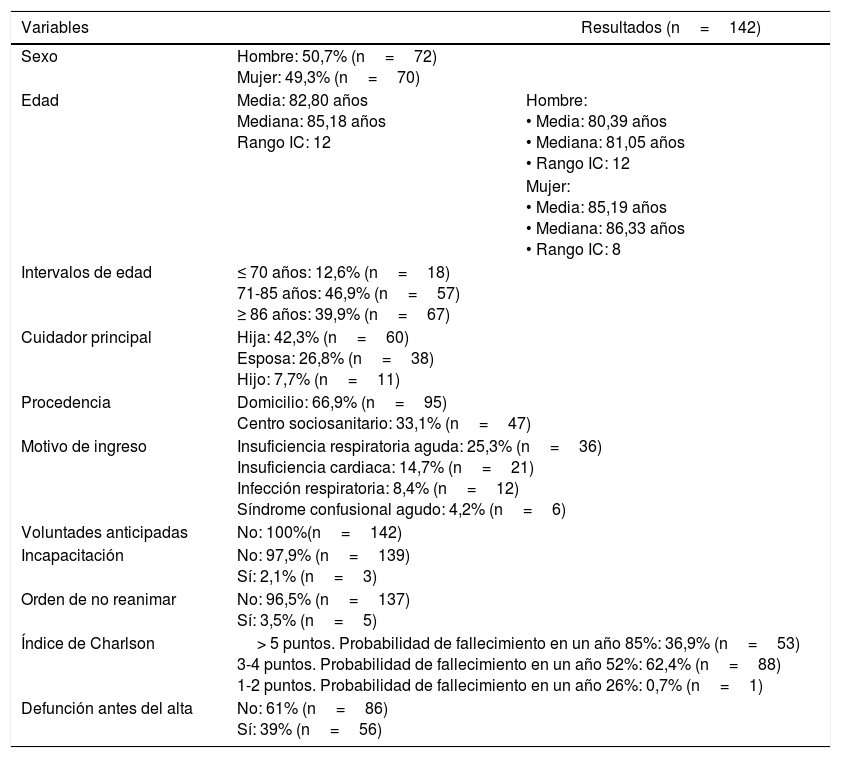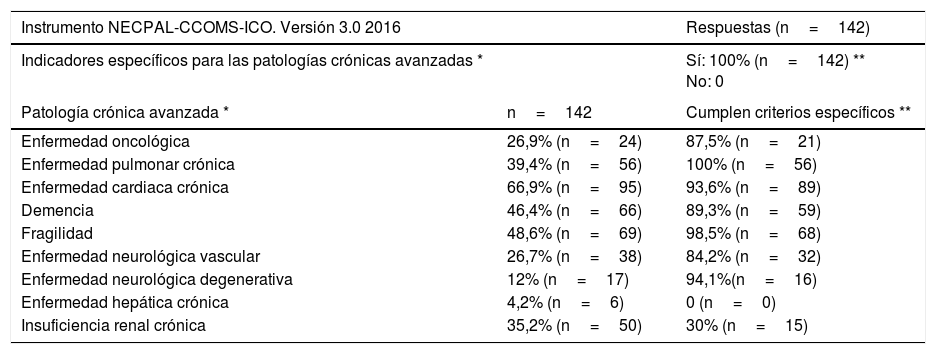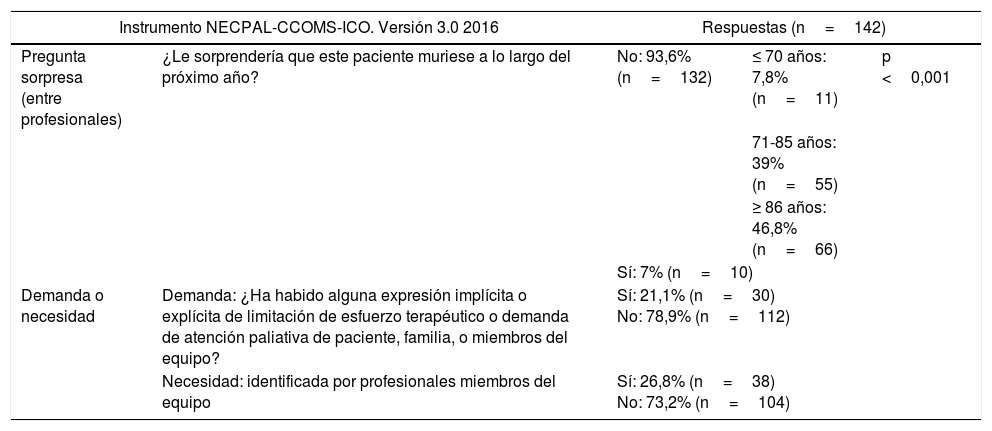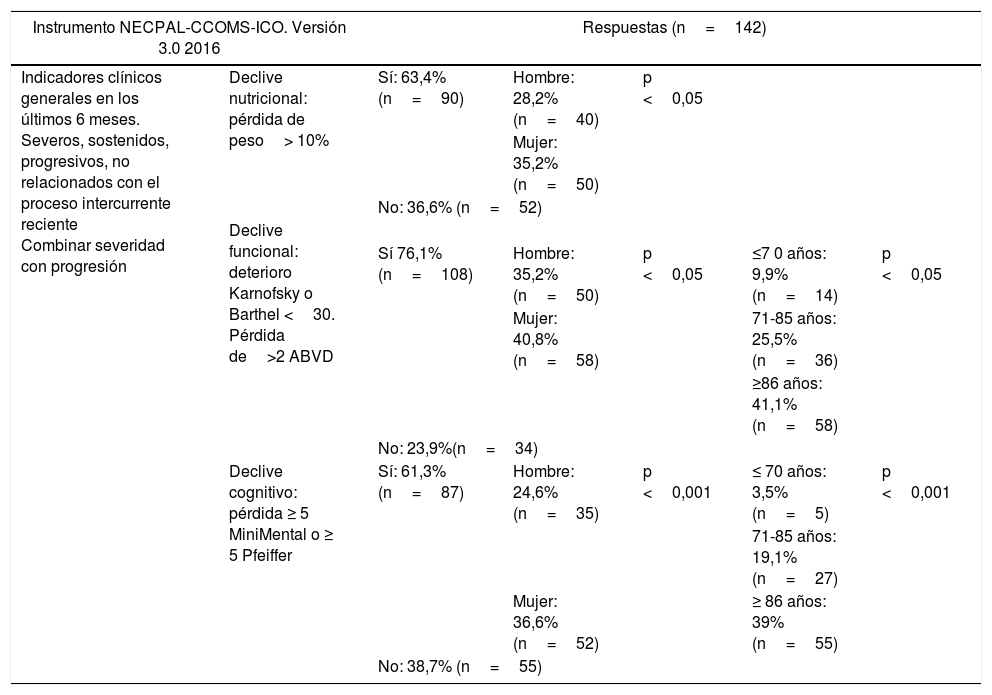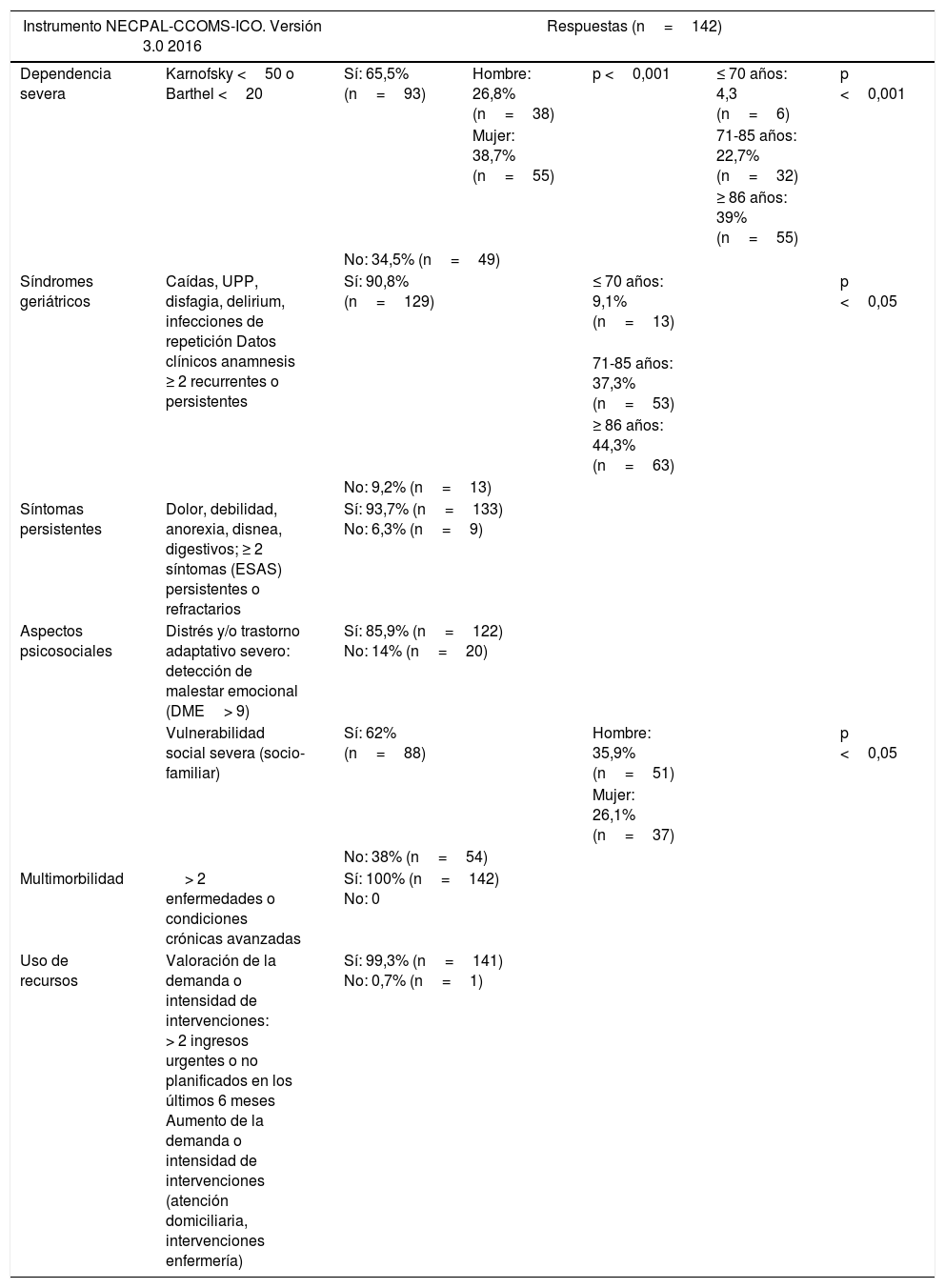Describir a los pacientes crónicos avanzados ingresados en un servicio de Medicina Interna e identificar si cumplen criterios de necesidad de atención paliativa, en el momento del alta hospitalaria según el instrumento NECPAL-CCOMS.ICO®.
Material y métodosEstudio observacional, descriptivo y transversal realizado en pacientes ingresados en el Servicio de Medicina Interna del Hospital Clínico Universitario Lozano Blesa de Zaragoza, con diagnóstico de enfermedades crónicas evolutivas avanzadas, desde el 1 de mayo del 2017 hasta el 1 de septiembre del 2017. Variables: sexo, edad, patología crónica avanzada, motivo del ingreso, cuidador principal, procedencia (residencia, domicilio, etc.), número de reingresos en el año previo, existencia de declaración de voluntades anticipadas, existencia de incapacitación del paciente, existencia de orden de no reanimar, índice de Charlson y todas las variables que contiene el instrumento NECPAL CCOMS-ICO® versión 3.0 del 2016. La recogida de datos se realizó cuando se programaba el alta del paciente habiéndose resuelto la circunstancia aguda que motivó el ingreso.
ResultadosLa muestra fue de 142 pacientes que cumplieron los criterios de inclusión: diagnóstico de enfermedades crónicas evolutivas avanzadas, índice de Charlson ≥ 3 en el momento en que se programaba el alta del paciente y firma del consentimiento informado. La edad media fue de 85,80 años y el 50,7% fueron hombres. La edad media de las mujeres fue superior a la de los varones. La patología crónica avanzada más prevalente fue la enfermedad cardiaca crónica. Ningún paciente tenía registrada la declaración de voluntades anticipadas. En más de un 50% se determinó declive nutricional, funcional, cognitivo y dependencia severa. En más de un 90% hubo presencia de síndromes geriátricos y síntomas persistentes. La presencia de malestar emocional también fue evidente, al igual que el uso de recursos.
ConclusionesUn enfoque paliativo en la atención a la cronicidad generaría un impacto muy positivo sobre la calidad de vida del enfermo y la familia, influiría positivamente sobre los sistemas sanitarios y supondría un ahorro de costes.
Implementar el instrumento NECPAL CCOMS-ICO® en aquellos servicios de salud que atienden altas proporciones de enfermos crónicos, acompañado de medidas de formación al personal sanitario y de adaptación de los recursos, puede introducir un cambio cualitativo y cuantitativo muy relevante en nuestro sistema.
To describe the advanced chronic patients admitted to an internal medicine department and to identify whether they meet the criteria for the need for palliative care at the time of hospital discharge according to the NECPAL-CCOMS.ICO® instrument.
Material and methodsObservational, descriptive and cross-sectional study performed on patients admitted to the internal medicine department of the Hospital Clínico Universitario Lozano Blesa (Saragossa), with a diagnosis of advanced progressive chronic diseases, from May 1, 2017 to September 1, 2017 Variables: sex, age, advanced chronic disease, reason for admission, primary caregiver, origin (residence, address, etc.), number of readmissions in the previous year, existence of advance directives, disability of the patient, existence of order not to resuscitate, Charlson Index and all the variables contained in the NECPAL Instrument CCOMS-ICO ® VERSION 3.0 2016. The data collection was done when the patient was scheduled to be discharged, having resolved the acute circumstance that led to the admission.
Resultsthe sample size was 142 patients who met the inclusion criteria: diagnosis of disease advanced evolutionary chronic ages, Charlson Index ≥3 at the time the patient was scheduled to be discharged and signed their informed consent. The average age was 85.80 years and 50.7% were men. The average age of the women was higher than that of the men. The most prevalent advanced chronic disease was chronic heart disease. None of the patients had advance care directives in place.. Nutritional, functional, cognitive and severe dependence was determined in more than 50%. In more than 90% there was the presence of geriatric syndromes and persistent symptoms. The presence of emotional distress was also evident, as was the use of resources.
ConclusionsA palliative approach in the care of chronicity would have a very positive impact on the quality of life of the patient and family, would positively influence health systems and would result in cost savings.
Implementing the NECPAL CCOMS-ICO® instrument in the health services that serve high proportions of chronically ill patients, accompanied by training measures for health personnel and adaptation of resources, can introduce a qualitative and quantitative change that is very relevant in our the health system.
Artículo
Comprando el artículo el PDF del mismo podrá ser descargado
Precio 19,34 €
Comprar ahora






